FEBRUARY 1979, the disco years
THE MYSTERY OF GILLEY'S
|
|
Back in the
ancient days of Camelot, the peace was disturbed by disquieting
tales of coastal raids conducted by Vikings and Danes.
Modern Camelot was no different. At this very
moment, Disco Dancing was being threatened by a
barbarian race known as "Rednecks" and
"Kickers". I
learned this news from Joanne.
On the Monday following the In Crowd rejection courtesy
of Victoria's vicious rumor, Joanne showed up for
our private lesson with smoke coming from her ears.
She was royally pissed off.
"Why do I
even bother showing up? Last Friday no one spoke to me
and no
one asked me to dance but you. Victoria's
friends have to be the biggest jerks in the world. Why
were they so mean to me? Do you have
any idea what I am doing wrong?"
Actually I did.
I assumed her mistake was somehow related to showing her
poorly-disguised affection towards me in public, a gesture that provoked
Victoria's neverending wrath every Friday. Joanne had
been good at hiding her feelings for four weeks, but lately
she had slipped. However, I
preferred not to
bring that subject up, so I tiptoed around it.
"I am just as
much in the dark as you are, Joanne, but I agree you have a right to
feel hurt. Those
people are ordinarily very
warm and outgoing. Why they avoided you last Friday upset me too.
I don't know what to say, but I will try to get an answer."
It would
take me a month to get to the bottom,
but I could already tell something evil was at work here. I could not for the life of me
understand why these people had been so frosty to my friend.
However,
I assumed Victoria had to be behind it. Who else?
Knowing how Victoria felt about Joanne, she was the likely culprit.
Whatever she had done, it upset Joanne badly.
"Well, they
may be your friends, Rick, but I know
those people ignored me deliberately. I am not
going near them again. To hell with all of them.
I am sick of those snobs."
Joanne
wasn't all that brave to begin with, so she was
understandably upset by the blatant rejection.
The following
Friday Joanne did not make her usual appearance at the
Pistachio Club. Victoria was genuinely pleased to note
Joanne's absence. Without Joanne present to wow the
citizens of Camelot with her fine dancing, tonight Victoria
was
the Dancing Queen. This suited her just fine.
|
When Joanne returned to the
studio the following Monday to help me, I asked
where she had been. "Hey, Joanne,
what happened to you on Friday?"
Joanne frowned.
"I went to Gilley's instead."
Gilley's?
My eyes grew wide. Gilley's was a notorious
country-western dance club located near the Houston Ship
Channel twenty miles away. It was rumored to be the
Redneck Capital of Texas. The Disco Superstar at a
kicker club? That was weird.
"How did you get
to Gilley's, Joanne? Last time I
checked, Westheimer doesn't stretch that far."
Joanne gave me a
dirty look. "Ha ha, aren't you funny! A
girlfriend at work invited me to go with her. I had
fun and I danced a lot. The people there treated me a
lot better than your bullshit Disco crowd."
Touché.
I was certain something was taking
place behind my back. Whatever the problem was, it was driving a wedge between us.
Joanne wasn't sure whose side I was on anymore. Some
part of her held me responsible for setting her up for the
deliberate snub. The bitterness in her voice hurt my
feelings.
|
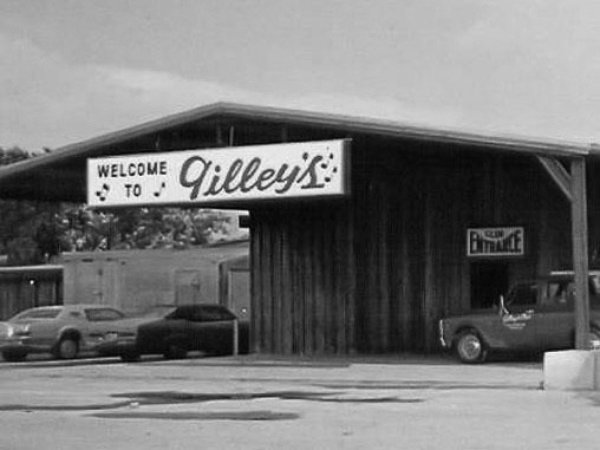 |
Now Joanne
started to cry. I knew Joanne had been upset, but
not to this extent. Embarrassed, she got up and
left before our Monday class started. Seeing her
leave, for the first time I wondered if I was going to
lose Joanne.
Joanne had
made a powerful first impression at Camelot back at the
start of January. Since then her excellent dancing
had continued to impress people. However, recently
Joanne had lost her confidence because people rarely
spoke to her. It was Joanne's own fault. Her continued silence
had done her in. The poor woman was
overwhelmed by the sophistication of the people around
her. As I have said, my Disco group consisted of
successful professionals who conversed fluently.
Since Joanne had struggled to finish high school, the
education and knowledge gulf between Joanne and the
others was vast. Joanne listened to their
conversation and decided this crowd was way out of her
league. To disguise her insecurity, Joanne kept
her thoughts to herself.
Joanne had several men whom she referred to as
her dance partners. However, whenever she wasn't
dancing,
she just sat and watched. Sometimes she sat alone,
other times with her two or three dance friends.
She rarely said a word. Sad to say, Joanne's
silence combined with her tendency to frown made people
think she was aloof. This was the origin of Joanne's 'Ice Queen'
nickname.
|
Victoria's
whispering campaign could not have come at a worse time.
The cold shoulder from the In Crowd struck at the same time she was wondering if it
was time to look for a different crowd. To me,
the story of Gilley's plus Joanne's tears indicated she had one foot out the door.
The thought of losing Joanne upset me greatly.
However, I said nothing because she left the studio before we
could talk things through.
Gilley's
was a big deal in Pasadena, located
20 miles to the east of downtown Houston.
No one in my
group of dance friends had ever been to Gilley's. Nor
had they shown any
interest. Joanne became the first and only person I knew who had ever
been there. Her favorable impression of
Gilley's left me feeling vaguely betrayed.
Since Gilley's seemed like enemy territory, her visit
struck me as retaliation for introducing her to my rude friends.
Sad to say, I deserved her disdain.
Pasadena is a blue collar
industrial town. Although
I had never visited Gilley's, I had driven past it
during my days as a social
worker.
At the turn of the century, Buffalo Bayou had been dredged
and widened to create the Houston Ship Channel. This
engineering feat made Houston the shipping champion of the
South. Since the Ship Channel terminated in Pasadena,
this was where the factories were
located with all its fumes.
Pasadena was
vital to Houston's economy, but their citizens were looked down
on by the city slickers as 'lower class', a nasty attitude
that surely irritated the residents.
Pasadena was a good place to work, but a tough place to
live. Due
to my social
work job, I had visited Pasadena dozens of times. Lined
with smoking refineries, Pasadena was not a pretty place.
The heavy industrial fumes created a pervasive odor. Due to the transient
nature of factory workers, trailer parks and rundown
apartments abounded. The distinct lack of trees,
attractive homes and green space didn't help.
Pasadena was said to be populated with rednecks,
white trash, and lowlifes. Sorry to say, there was truth
to this rumor. No doubt there were good people in
Pasadena, but my child abuse job exposed me to its
substantial dark underbelly.
Keep in mind that child
abusers are not the nicest people. The
ones in Pasadena set the low-bar standard. So far the
people I had met in Pasadena were the meanest, most racist
people I had encountered. I dreaded every visit.
Guess where a lot
of my "clients" liked to hang out?
Gilley's. Based on the
description I received from Joanne, Gilley's was a squalid
beer joint that fully deserved its reputation as
Redneck Mecca. Gilley's was immensely popular.
Joanne estimated a crowd of
well over one thousand people. The thought of a joint
with a thousand redneck cowboys made me shudder. However,
Joanne said she felt right at home. Not a good
omen.
A couple years ago, I had passed
by Gilley's after
investigating a child neglect case. Curious, I pulled
over to have
a look. Gilley's was a
massive ramshackle building covered by a corrugated metal
roof. Capable of holding 6,000 folks, this giant barn looked more like
an airplane hanger
than dance hall.
The crushed oyster shell parking lot was nearly the size of
the Gulf of Mexico. Based on hundreds of pickup trucks
featuring Klu Klux Klan symbols, Confederate flags and gun racks,
it was easy to believe
the rumors of racism, fighting and drinking.
Due to my prejudice, I was aghast when I heard about the opening of Cowboy
in Houston's posh Galleria area
not far from wealthy River Oaks. The very thought of adding a Kicker club like
Gilley's in an area of town that catered to the wealthy
elite seemed preposterous.
Having Cowboy
just a few blocks from
the Pistachio Club was hitting way too close to
home.
As long as the rednecks stayed in
Pasadena, that was fine by me, but now the enemy was in my
backyard.
From what I gathered,
the rednecks thought the same thing about Disco dancers.
My crowd didn't like them, they didn't like us.
Kickers and Disco Dancers were avowed rivals who wanted
nothing to do with the other. So why would someone
decide to bring a beer joint like Gilley's to our doorstep?
Joanne's decision to visit Gilley's upset me no end because
it made me wonder why anyone would put a kicker club
like Cowboy in a place where it did not
belong. With Disco hotter than a burning comet, I
could not understand what was going on. Due to my
confusion,
I had a bad feeling about this.
|
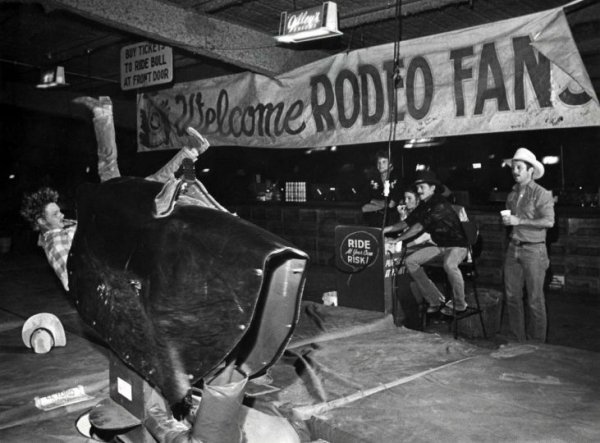
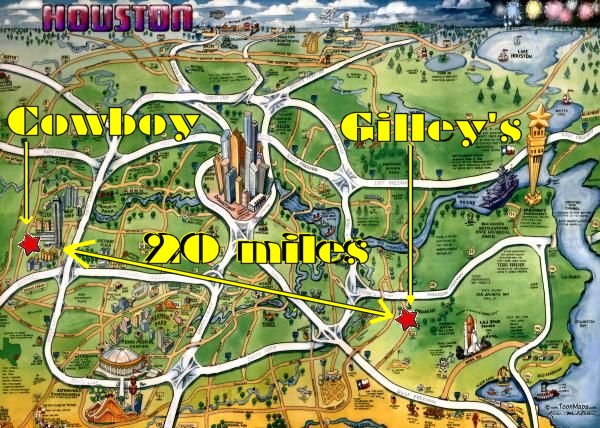
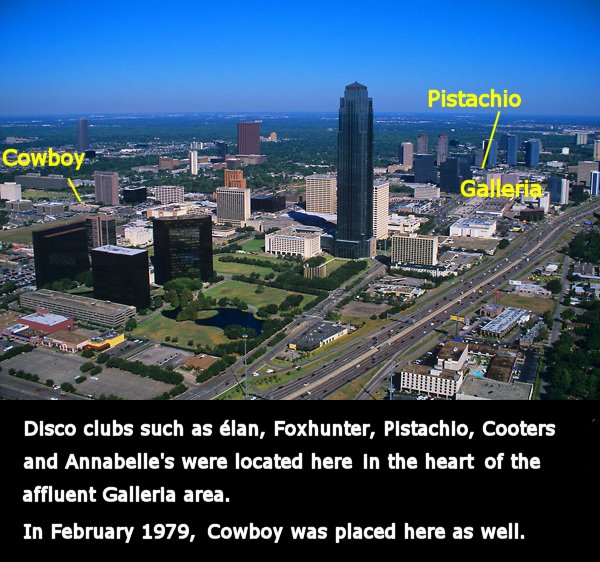
|
SPRING 1979, the disco years
THE WESTERN TRANSITION BEGINS
|
|
The opening of
Cowboy in February shook me up something fierce.
Joanne's visit to Gilley's three weeks later upset me even more.
I was angry to learn that Cowboy
had displaced Foxhunter, one of my
favorite hangouts. It was irritating to have this
unexplained Western club appear where it did not belong, it was
worse to see a
popular Disco removed to make room for it. From the start, I took
the appearance of Cowboy as a very bad omen. History would prove me right. The opening of
Cowboy triggered a massive chain reaction. Throughout the
spring of 1979, Discos in Houston would
mysteriously
close their doors without warning only to reopen a few weeks later as
a Western club.
Fortunately,
most of these flip-flops involved marginal Discos I never visited.
To my great relief, my favorite spots such as Pistachio,
élan,
and Annabelle's
were not affected. Still, it was weird. Something very ominous was
going on here. What possible explanation could
explain why these
Western clubs were springing up like weeds?
Since I wanted Disco to
last forever, each
time a Disco closed during the Spring, I nearly bled to
death with worry. Lance Stevens
had warned me that Disco wouldn't last. Patricia
had warned me
that Disco wouldn't last. Gee whiz, even my own mother
had predicted Disco would not last. They all said Disco was
just a
fad. As the appearance of these new Western clubs underscored
their warnings, I felt very insecure.
|
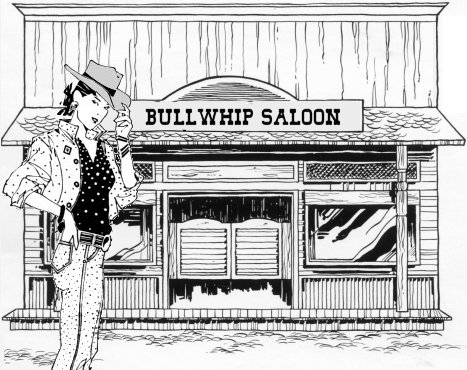 |
I
prayed they were wrong. Did this strange 'Disco-to-Western' transformation portend the
dying days of Disco were upon us? It certainly felt that way. Since the Big Band Swing Era
had lasted throughout the Thirties and World War II, I had hoped the Disco Era would
at least
stick around that long
as well.
Now all of a sudden I was not sure Disco would even last till
the end of
1979. However, there was contradictory evidence. At
the same time those Western clubs began to appear, Disco was
thriving here in Houston and the rest of America as well.
I knew for a fact that Disco was still hot in
Houston. I could see it with my own eyes!
I would go Disco dancing and see a packed house. My
Disco classes
were huge and Camelot was in full swing. This raised a
serious question. Since there was no
sign of Disco abatement that I could detect, why did these
Western clubs keep popping up?
|
These
changes were threatening my career.
Will someone please explain what is going on? Why does a
Disco have to die to make room? Was there some reason why
Houston could not have both? My ignorance of the reason behind these changes made me
feel out of control.
I felt
lost and powerless on a little Tiki raft. Swept along by
powerful ocean currents, I was buffeted by giant waves beyond my power to resist.
Unless I could find out what was going on, I was helpless
to prevent my demise. The Mystery of
it all freaked me out. Discos that had opened one short year ago to handle the Disco
surge were closing and reopening as Western clubs to handle the
surge of... what?
There was no Western
Surge. No one I knew cared about Western
dancing. I am completely
serious. None of my students had the slightest bit of interest
in Western dancing. Therefore this strange development
made no sense. How
should I react to these bad omens? Maybe it was time
I started
looking for a new profession. However my heart begged me to hang in
there. No point in jumping ship just yet. Who knows what the future might hold?
|
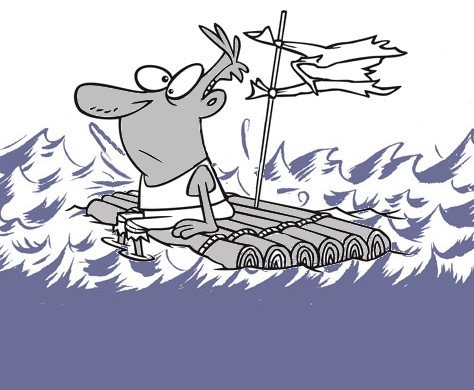 |
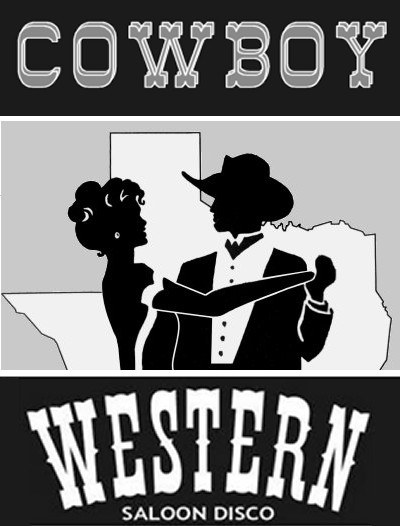 |
Rick Archer's Note:
One of the problems
in writing a memoir is to know when to reveal the secret
behind the mystery. The typical rule of thumb is
to use chronological order. That would not work in
this case. I never was able to solve the mystery
until I began writing my book in 2013. Why did it
take so long? Because there was no Internet back
in 1979.
Since this is a
complicated book with lots of moving parts, I think the
Reader is best served by receiving a partial explanation
now.
The C&W Transition
took place in the spring of 1979. Two years later Michael Demarest wrote an excellent article in Time
Magazine to explain what was going on behind my back.
I wish I had
known about this article back when the changes occurred, but
no such luck.
|
C&W
Nightclubs Riding High
-- written by Michael Demarest, Time Magazine, 1981
In 1975 Houston had at most a dozen cactus cabarets.
By the time 1981 rolled around, Houston had more than 300, few of which cared to
emulate Gilley's Dodge City outlaw style.
They had a better idea... let's copy Cowboy!
This
transition
started in February 1979 when McFaddin-Kendrick, a Houston-based conglomerate, opened
Cowboy, the city's first upscale Twostep saloon.
Following its success with
Cowboy, McFaddin-Kendrick
went on to launch a national chain of 40 western clubs that
mixed country music with disco.
Cowboy's success revolutionized the club industry. Before
Cowboy came along, there was no such thing as a "classy"
country place. It used to be your choice ranged from
your standard
country dump #1 to your standard country dump #2.
Prior to
McFaddin-Kendrick's
daring experiment, no one recognized the market for
"attractive" western clubs even existed. Mixing
in Disco music was equally radical. Who would ever guess you could successfully
combine disco and country-western under one roof? Surely some Texas redneck
would shoot a Disco dancer and call it justifiable homicide.
Surprise
surprise. Once Cowboy took off for the moon in
typical Space City fashion, everyone else jumped on the
bandwagon and opened Cowboy imitations. The most successful,
Fool's Gold and San
Antone Rose, were located in affluent Houston residential
areas. Like Cowboy, each club catered to the Gucci gauchos. Imitation proved to be the most sincere form of flattery.
In the space of six months during 1979, McFaddin-Kendrick
permanently changed the landscape of Houston's night clubs forever.
|
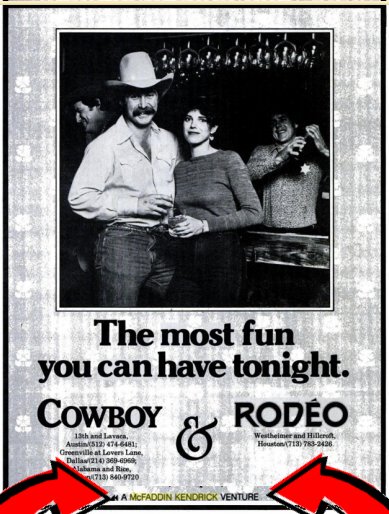
Cowboy, the
Country-Western
dance club that
started it all
|
|
|